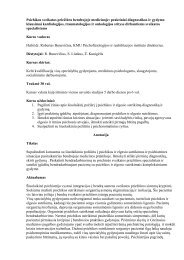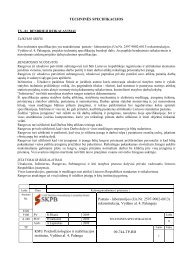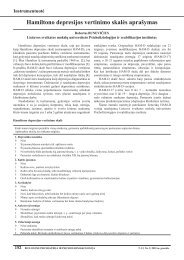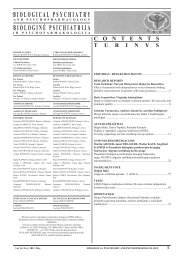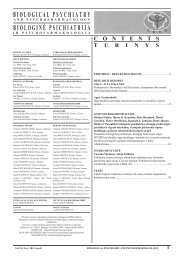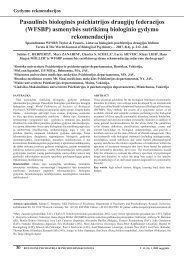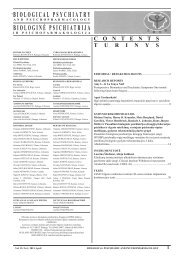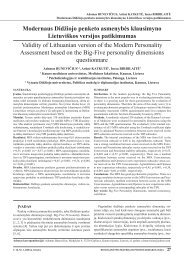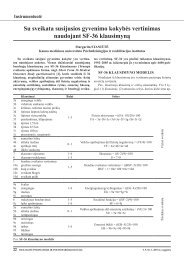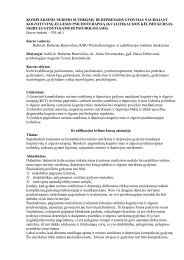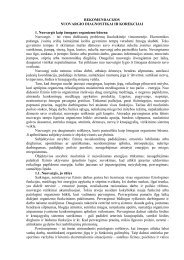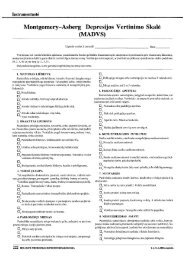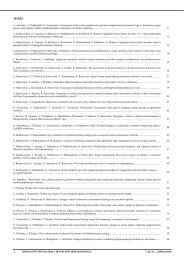biologinÄ psichiatrija - Psichofiziologijos ir reabilitacijos institutas ...
biologinÄ psichiatrija - Psichofiziologijos ir reabilitacijos institutas ...
biologinÄ psichiatrija - Psichofiziologijos ir reabilitacijos institutas ...
- No tags were found...
Create successful ePaper yourself
Turn your PDF publications into a flip-book with our unique Google optimized e-Paper software.
Elmārs RancānsEnigma of Bipolar depressionserotonin reuptake inhibitors (SSRI), and lithium or divalproexplus SSRI/Bupropion continue to remain the f<strong>ir</strong>st-lineoptions for the management of bipolar depression.Modern antidepressants are relatively safe in the treatmentof bipolar depression, but appear to have limited efficacy inRCTs. Antidepressants should be prescribed with mood stabilisers,which could attenuate risks of treatment-emergentaffective switches.F<strong>ir</strong>st-line options in the maintenance treatment of bipolardisorder continue to be lithium, lamotrigine, valproate andolanzapine-fluoxetine combination. New data also supportquetiapine monotherapy as a second-line option for the managementof bipolar II depression. There is recent evidence tosupport the use of olanzapine as a second-line maintenancetherapy for bipolar depression. When antidepressants are effective,the duration of maintenance therapy should be determinedon a case-by-case basis.Psychosocial interventions for maintenance therapy areassociated with reduction in overall rates of relapses, especiallyin depressive phase of illness.References:1. Wittchen H.U., Jacobi F. Size and burden of mental disorders in Europe – a critical review andappraisal of 27 studies // Eur. Neuropsychopharmacol. – 2005, vol. 15, p. 357–376.2. Pini S., de Q., V, Pagnin D. et al. Prevalence and burden of bipolar disorders in European countries// Eur. Neuropsychopharmacol. – 2005, vol. 15, p. 425–434.3. Akiskal H.S., Pinto O. The evolving bipolar spectrum. Prototypes I, II, III, and IV // Psychiatr. Clin.North Am. – 1999, vol. 22, p. 517–34, vii.4. Judd L.L., Akiskal H.S., Schettler P.J. et al. The long-term natural history of the weekly symptomaticstatus of bipolar I disorder // Arch Gen Psychiatry. – 2002, vol. 59, p. 530–537.5. Judd L.L., Akiskal H.S., Schettler P.J. et al. A prospective investigation of the natural history of thelong-term weekly symptomatic status of bipolar II disorder // Arch Gen Psychiatry. – 2003, vol. 60,p. 261–269.6. Akiskal H.S., Maser J.D., Zeller P.J. et al. Switching from ‘unipolar’ to bipolar II. An 11-yearprospective study of clinical and temperamental predictors in 559 patients // Arch. Gen. Psychiatry.– 1995, vol. 52, p. 114–123.7. Allila<strong>ir</strong>e J.F., Hantouche E.G., Sechter D. et al. [Frequency and clinical aspects of bipolar II disorderin a French multicenter study: EPIDEP] Frequence et aspects cliniques du trouble bipola<strong>ir</strong>e IIdans une etude multicentrique francaise: EPIDEP // Encephale. – 2001, vol. 27, p. 149–158.8. Benazzi F. Antidepressant-associated hypomania in outpatient depression: a 203-case study in privatepractice // J Affect. Disord. – 1997, vol. 46, p. 73–77.9. Goldberg J.F., Harrow M., Whiteside J.E. Risk for bipolar illness in patients initially hospitalizedfor unipolar depression // Am J Psychiatry. – 2001, vol. 158, p. 1265–1270.10. Perlis R.H., Brown E., Baker R.W., Nierenberg A.A. Clinical Features of Bipolar DepressionVersus Major Depressive Disorder in Large Multicenter Trials // American Journal of Psychiatry.– 2006, vol. 163, p. 225–231.11. Zornberg G.L., Pope H.G., Jr. Treatment of depression in bipolar disorder: new d<strong>ir</strong>ections for research// J Clin. Psychopharmacol. – 1993, vol. 13, p. 397–408.12. Souza F.G., Goodwin G.M. Lithium treatment and prophylaxis in unipolar depression: a meta-analysis// Br. J Psychiatry. – 1991, vol. 158, p. 666–675.13. Adli M., Bschor T., Canata B. et al. [Lithium in the treatment of acute depression] // Fortschr.Neurol. Psychiatr. – 1998, vol. 66, p. 435–441.14. Winsberg M.E., DeGolia S.G., Strong C.M., Ketter T.A. Divalproex therapy in medication-naiveand mood-stabilizer-naive bipolar II depression // J Affect. Disord. – 2001, vol. 67, p. 207–212.15. Davis L.L., Bartolucci A., Petty F. Divalproex in the treatment of bipolar depression: a placebocontrolledstudy // J Affect. Disord. – 2005, vol. 85, p. 259–266.16. Ghaemi S.N., Gilmer W.S., Goldberg J.F. et al. Divalproex in the treatment of acute bipolar depression:a preliminary double-blind, randomized, placebo-controlled pilot study // J Clin. Psychiatry.– 2007, vol. 68, p. 1840–1844.17. Bowden C.L., Calabrese J.R., McElroy S.L. et al. A randomized, placebo-controlled 12-month trialof divalproex and lithium in treatment of outpatients with bipolar I disorder. Divalproex MaintenanceStudy Group // Arch. Gen. Psychiatry – 2000, vol. 57, p. 481–489.18. Ballenger J.C., Post R.M. Carbamazepine in manic-depressive illness: a new treatment // Am JPsychiatry. – 1980, vol. 137, p. 782–790.19. Maj M., P<strong>ir</strong>ozzi R., Kemali D. Long-term outcome of lithium prophylaxis in bipolar patients // ArchGen Psychiatry. – 1991, vol. 48, p. 772.20. Ballenger J.C. The clinical use of carbamazepine in affective disorders // J Clin. Psychiatry. – 1988,vol. 49 Suppl., p. 13–21.21. Small J.G. Anticonvulsants in affective disorders // Psychopharmacol. Bull. – 1990, vol. 26, p.25–36.22. Calabrese J.R., Bowden C.L., Sachs G.S. et al. A double-blind placebo-controlled study of lamotriginemonotherapy in outpatients with bipolar I depression. Lamictal 602 Study Group // J Clin.Psychiatry. – 1999, vol. 60, p. 79–88.23. Frye M.A., Ketter T.A., Kimbrell T.A. et al. A placebo-controlled study of lamotrigine and gabapentinmonotherapy in refractory mood disorders // J Clin. Psychopharmacol. – 2000, vol. 20, p.607–614.24. Van der Loss, M. and Nolen, W. Lamotrigine as add-on to lithium in bipolar depression // Presentedat the Fifth EuropeanStanley Conference on Bipolar Disorder, Barcelona, October 5–7, 2006.25. Yatham L.N., Kennedy S.H., O’Donovan C. et al. Canadian Network for Mood and Anxiety Treatments(CANMAT) guidelines for the management of patients with bipolar disorder: update 2007// Bipolar. Disord. – 2006, vol. 8, p. 721–739.26. Schaffer A., Zuker P., Levitt A. Randomized, double-blind pilot trial comparing lamotrigine versuscitalopram for the treatment of bipolar depression // J Affect. Disord. – 2006, vol. 96, p. 95–99.27. Nierenberg A.A., Ostacher M.J., Calabrese J.R. et al. Treatment-Resistant Bipolar Depression:A STEP-BD Equipoise Randomized Effectiveness Trial of Antidepressant Augmentation WithLamotrigine, Inositol, or Risperidone // American Journal of Psychiatry. – 2006, vol. 163, p. 210–216.28. McIntyre R.S., Mancini D.A., McCann S. et al. Top<strong>ir</strong>amate versus bupropion SR when added tomood stabilizer therapy for the depressive phase of bipolar disorder: a preliminary single-blindstudy // Bipolar. Disord. – 2002, vol. 4, p. 207–213.29. Ghaemi S.N., Sh<strong>ir</strong>zadi A.A., Klugman J. et al. Is adjunctive open-label zonisamide effective forbipolar disorder? // J Affect. Disord. – 2008, vol. 105, p. 311–314.30. Zarate C.A., Jr., Qu<strong>ir</strong>oz J.A., Singh J.B. et al. An open-label trial of the glutamate-modulating agentriluzole in combination with lithium for the treatment of bipolar depression // Biol. Psychiatry.– 2005, vol. 57, p. 430–432.31. Goldberg J.F., Burdick K.E., Endick C.J. Preliminary randomized, double-blind, placebo-controlledtrial of pramipexole added to mood stabilizers for treatment-resistant bipolar depression // AmJ Psychiatry. – 2004, vol. 161, p. 564–566.32. Zarate C.A., Jr., Payne J.L., Singh J. et al. Pramipexole for bipolar II depression: a placebo-controlledproof of concept study // Biol. Psychiatry. – 2004, vol. 56, p. 54–60.33. Frangou S., Lewis M., McCrone P. Efficacy of ethyl-eicosapentaenoic acid in bipolar depression:randomised double-blind placebo-controlled study // Br. J Psychiatry. – 2006, vol. 188, p. 46–50.34. Keck P.E., Jr., Mintz J., McElroy S.L. et al. Double-blind, randomized, placebo-controlled trials ofethyl-eicosapentanoate in the treatment of bipolar depression and rapid cycling bipolar disorder //Biol. Psychiatry. – 2006, vol. 60, p. 1020–1022.35. Altshuler L., Suppes T., Black D. et al. Impact of antidepressant discontinuation after acute bipolardepression remission on rates of depressive relapse at 1-year follow-up // Am J Psychiatry. – 2003,vol. 160, p. 1252–1262.36. Amsterdam J.D., Shults J. Fluoxetine monotherapy of bipolar type II and bipolar NOS major depression:a double-blind, placebo-substitution, continuation study // Int. Clin. Psychopharmacol.– 2005, vol. 20, p. 257–264.37. Nemeroff C.B., Evans D.L., Gyulai L. et al. Double-blind, placebo-controlled comparison of imipramineand paroxetine in the treatment of bipolar depression // Am J Psychiatry. – 2001, vol. 158,p. 906–912.38. Tohen M., Vieta E., Calabrese J. et al. Efficacy of olanzapine and olanzapine-fluoxetine combinationin the treatment of bipolar I depression // Arch. Gen. Psychiatry. – 2003, vol. 60, p. 1079–1088.39. Sachs G.S., Nierenberg A.A., Calabrese J.R. et al. Effectiveness of adjunctive antidepressant treatmentfor bipolar depression // N Engl J Med. – 2007, vol. 356, p. 1711–1722.40. Post R.M., Altshuler L.L., Leverich G.S. et al. Mood switch in bipolar depression: comparison ofadjunctive venlafaxine, bupropion and sertraline // Br. J Psychiatry. – 2006, vol. 189, p. 124–131.41. Boerlin H.L., Gitlin M.J., Zoellner L.A., Hammen C.L. Bipolar depression and antidepressantinducedmania: a naturalistic study // J Clin. Psychiatry – 1998, vol. 59, p. 374–379.42. Peet M. Induction of mania with selective serotonin re-uptake inhibitors and tricyclic antidepressants// Br. J Psychiatry – 1994, vol. 164, p. 549–550.43. Leverich G.S., Altshuler L.L., Frye M.A. et al. Risk of switch in mood polarity to hypomaniaor mania in patients with bipolar depression during acute and continuation trials of venlafaxine,sertraline, and bupropion as adjuncts to mood stabilizers // Am J Psychiatry. – 2006, vol. 163, p.232–239.44. Sachs G.S., Printz D.J., Kahn D.A. et al. The Expert Consensus Guideline Series: Medication Treatmentof Bipolar Disorder 2000 // Postgrad. Med. – 2000, vol. Spec No, p. 1–104.45. Vieta E., Martinez-Aran A., Goikolea J.M. et al. A randomized trial comparing paroxetine and venlafaxinein the treatment of bipolar depressed patients taking mood stabilizers // J Clin. Psychiatry.– 2002, vol. 63, p. 508–512.46. Goldberg J.F., Perlis R.H., Ghaemi S.N. et al. Adjunctive antidepressant use and symptomatic recoveryamong bipolar depressed patients with concomitant manic symptoms: findings from theSTEP-BD // Am J Psychiatry. – 2007, vol. 164, p. 1348–1355.47. Brown E.B., McElroy S.L., Keck P.E. Jr. et al. A 7-week, randomized, double-blind trial of olanzapine/fluoxetinecombination versus lamotrigine in the treatment of bipolar I depression // J Clin.Psychiatry. – 2006, vol. 67, p. 1025–1033.48. Amsterdam J.D., Shults J. Comparison of fluoxetine, olanzapine, and combined fluoxetine plusolanzapine initial therapy of bipolar type I and type II major depression – lack of manic induction// J Affect. Disord. – 2005, vol. 87, p. 121–130.49. Calabrese J.R., Keck P.E. Jr., Macfadden W. et al. A randomized, double-blind, placebo-controlledtrial of quetiapine in the treatment of bipolar I or II depression // Am J Psychiatry. – 2005, vol. 162,p. 1351–1360.50. Thase M.E., Macfadden W., Weisler R.H. et al. Efficacy of quetiapine monotherapy in bipolar I andII depression: a double-blind, placebo-controlled study (the BOLDER II study) // J Clin. Psychopharmacol.– 2006, vol. 26, p. 600–609.51. H<strong>ir</strong>schfeld R.M., Suppes T., Vieta E. Quetiapine Monotherapy for Bipolar II Depression: PooledResults from two Placebo-controlled Studies. // New Research Abstracts, Annual Meeting of theAmerican Psychiatric Association, Toronto, May 20–25, 2006 [Abstract NR227].52. Ketter T.A., Wang P.W., Chandler R.A. et al. Adjunctive aripiprazole in treatment-resistant bipolardepression // Ann. Clin. Psychiatry. – 2006, vol. 18, p. 169–172.53. Colom F., Vieta E. Efficacy of Group Psychoeducation in Bipolar Disorders: 5-Year Outcome //New Research Abstracts, Annual Meeting of the American Psychiatric Association, Toronto, May20–25, 2006 [Abstract NR27].54. Lam D.H., Hayward P., Watkins E.R. et al. Relapse prevention in patients with bipolar disorder:cognitive therapy outcome after 2 years // Am J Psychiatry. – 2005, vol. 162, p. 324–329.55. Scott J., Paykel E., Morriss R. et al. Cognitive-behavioural therapy for severe and recurrent bipolardisorders: randomised controlled trial // Br. J Psychiatry. – 2006, vol. 188, p. 313–320.56. Frank E., Kupfer D.J., Thase M.E. et al. Two-year outcomes for interpersonal and social rhythmtherapy in individuals with bipolar I disorder // Arch Gen Psychiatry. – 2005, vol. 62, p. 996–1004.57. Miklowitz D.J., Otto M.W., Frank E. et al. Intensive psychosocial intervention enhances functioningin patients with bipolar depression: results from a 9-month randomized controlled trial // AmJ Psychiatry. – 2007, vol. 164, p. 1340–1347.Gauta: 2008 04 05Priimta spaudai: 2008 05 12T. 10, Nr. 1, 2008 m. b<strong>ir</strong>želisBiologinė <strong>psichiatrija</strong> <strong>ir</strong> psichofarmakologija35



